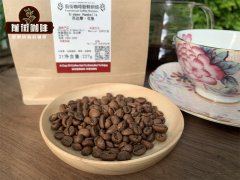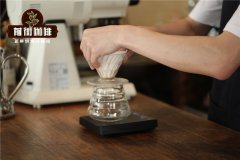The difference between individual coffee beans and mixed coffee beans is mixed coffee beans more suitable for espresso?
Some coffee packages are only marked with Arabica or Robusta (two major coffee varieties), which is like telling you whether a bottle of wine is red or white, and the information is not enough for you to make a more clear choice. Although generally speaking, the variety of Arabica is better than Robusta, but if only "Arabica" is marked on the product packaging is a more general name, it is not easy for consumers to distinguish the quality of coffee beans.
High-quality robusta coffee does exist, but it is rare, so buying Arabica is usually a safer choice. However, there are many inferior Arabica on the market, so what information should sensible consumers pay attention to on the product label?
Top coffee beans are usually described in considerable detail, such as origin, variety, preparation and flavor.
Single bean (Single Origin) VS. Formula bean (Blend)
The packaging sales of coffee beans can be divided into single product (Single Origin) or formula (Blend), there is basically no difference between the pros and cons, but to enjoy coffee in different ways. Individual coffee can directly reflect the flavor of individual coffee, while the formula shows the specific flavor outline created by the bean baker. Just as some whisky lovers prefer single wheat to blended whiskey, some coffee drinkers prefer individual items to recipes.

Single cup of coffee
Individual coffee is the purest way to enjoy daily coffee. Individual coffee refers to a single source of coffee beans (geographical area), such as Blue Mountain Coffee and Colombian Coffee. But the clarity may vary, perhaps just to inform the country where the coffee beans are grown, or to specify in more detail a region, a processing station, a coffee farm, or even a particular batch number in a particular country. Each coffee producing country has different practices for the determination and naming of origin, but the more clearly the baker can specify the origin, the more effectively it can raise consumer awareness. In addition to the openness and transparency of origin, many people like individual coffee because of its rich and varied flavor. The complexity of coffee drinks is beyond imagination, and most coffee lovers hope to appreciate and identify the subtle flavor differences of specific varieties and customs. For example, wine, although blended red wine made by grapes from different regions is also delicious, some wine tasters still prefer a single variety of wine from a particular winery. So wine tasters generally like to choose wines whose origin is marked to the winery or region.
Formula coffee
Generally speaking, single-product coffee lovers will think that the quality of the formula is poor, but in fact, there are also high-quality formula coffee. Since coffee beans are seasonal products, some individual coffees may not be available throughout the year, and the annual output may not be certain. the same coffee varieties may come from different places, and one of the main reasons for the roaster to reconcile different coffee beans is to produce coffee with the same flavor profile throughout the year. If properly made, the formula can brew coffee with a balanced flavor and gain high popularity, sometimes more popular than a single product.
Example of coffee recipe
The roaster blends the best flavor according to the characteristics of each coffee. Here is an example of coffee blending. The text clearly explains the origin and characteristics of the various coffee beans.
Boutique coffee companies usually include one or two recipes in a range of products, which are highly accepted by many people and are usually the best-selling products. Cafes generally offer a daily recipe for hand-brewed coffee and another for espresso, which offsets the acidity magnified by the use of espresso machines.
The recipe is made according to the style of the baker and the coffee beans used.
Kind. However, there are also many bakers who use recipes purely for economic reasons, mixing low-quality coffee beans to reduce costs. Some coffee brands, especially those that handle Italian-style baking, mix lower-priced robusta coffee into their products, which adds more caffeine and produces more bitterness.
To sum up, "formula coffee" is a mixture of beans from different regions or from all over the world, while "single coffee" refers to coffee from the same farm. When boutique coffee merchants mark "single product" or emphasize that it comes from "so-and-so manor" on the package, they usually want to send a clearer message and have a clear production resume on the packaging: the coffee comes from a certain farm, a certain production line or a coffee farm. These single-source coffee products are often marketed in limited or seasonal quantities, and may not be available all the year round, so they are also favored by many boutique coffee lovers.
Whether it is a single product or formula, as long as the coffee beans are properly taken care of in the process of planting and processing, carefully transported and roasted according to their characteristics, high-quality coffee can be created.
Important Notice :
前街咖啡 FrontStreet Coffee has moved to new addredd:
FrontStreet Coffee Address: 315,Donghua East Road,GuangZhou
Tel:020 38364473
- Prev

The best coffee beans in the world. Kenyan coffee or Manning?
The world's best Arabica coffee beans are ranked in no particular order by country, because the biggest factor is personal preference. For example, some people may prefer the wine and fruity acidity of Kenyan coffee to the classic balance of Colombian coffee, others may not. Therefore, we will continue to deny that there are subjective factors, including the most popular coffee, all of which
- Next

Novice Coffee entry what basic brewing equipment should be prepared for beginners to make coffee
The skill of brewing coffee by hand is the same as brewing Kungfu Tea. Different kinds of tea require different water temperature, utensils and brewing time, and so is tasting a good cup of coffee. Compared with machine brewing, through the extraction technique of hand-brewed coffee, we can have a better grasp of water temperature and water flow, and can restore the most primitive flavor of different coffee beans.
Related
- What brand of black coffee is the most authentic and delicious? what are the characteristics of the flavor of the authentic Rose Summer Black Coffee?
- Introduction to the principle and characteristics of the correct use of mocha pot A detailed course of mocha pot brewing coffee is described in five steps.
- Which is better, decaf or regular coffee? how is decaf made?
- How much is a bag of four cat coffee?
- How about four Cat Coffee or Nestle Coffee? why is it a cheap scam?
- Which is better, Yunnan four Cats Coffee or Nestle Coffee? How about cat coffee? is it a fake scam? why is it so cheap?
- How about Cat Coffee? what grade is a hoax? which instant coffee tastes better, four Cat Coffee, Nestle Coffee or G7 coffee?
- Process flow chart of coffee making-Starbucks coffee making process what coffee tastes good at Starbucks
- The top ten best coffee beans in the world Rose summer coffee or Tanzanian coffee tastes good
- Yunnan four cat coffee is good to drink?_four cat coffee is a big brand? four cat blue mountain coffee is fake?

